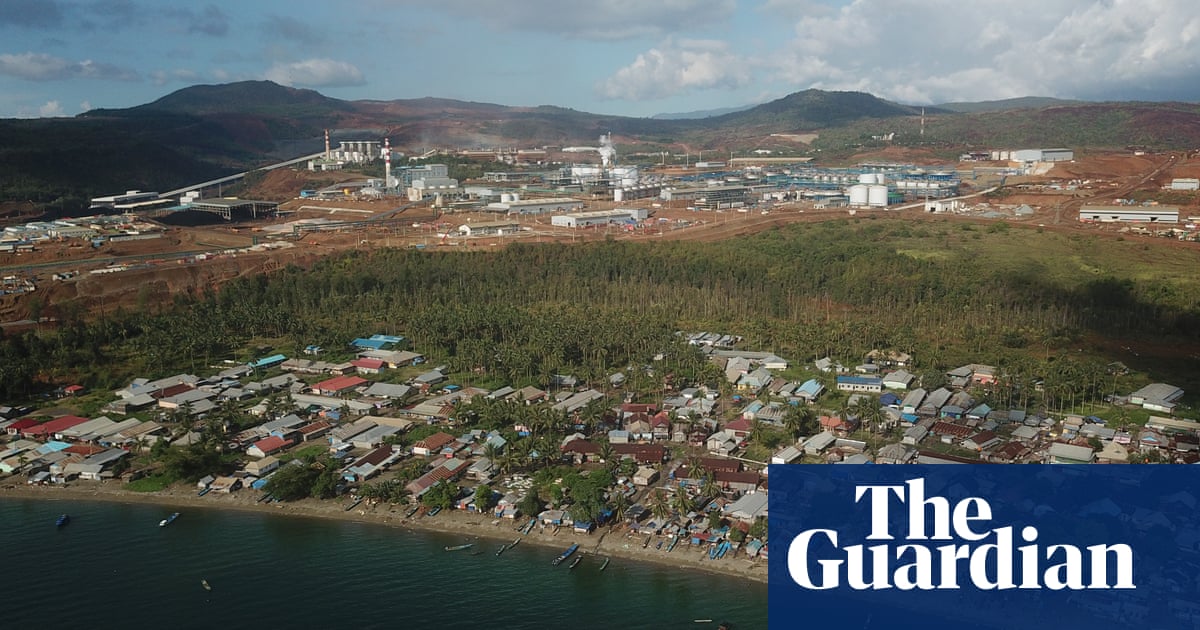One of Indonesia’s largest nickel-mining companies, which supplies a mineral critical to the global electric car industry, did not tell the public that local drinking water was polluted, according to documents seen by the Guardian.
Indonesia has become the world’s biggest producer of nickel, used in the production of wind turbines, solar panels and electric vehicle batteries. But observers have voiced concerns that regulatory oversight in the country has failed to keep up with the rush to develop mines to satisfy booming global demand.
Leaked documents seen by the Guardian suggest a source of drinking water close to a $1bn (£800m) mining project owned by the Indonesia-based Harita Group on remote Obi Island, was contaminated with unsafe levels of hexavalent chromium (Cr6), the cancer-causing chemical more widely known for its role in the Erin Brockovich story and film.
Cr6 can cause liver damage, reproductive problems and developmental harm when ingested or inhaled. Long-term exposure through drinking water has also been linked to stomach cancer. Evidence has shown that Cr6 in drinking water can be a result of industrial processes.
The leak comes after a Guardian investigation into pollution at the site in 2022 was disputed by the mining company, which extracts and processes nickel for use in EV batteries.
For the 2022 investigation, water samples collected from a spring in the village of Kawasi, less than 200 metres from the mining site, were tested at government-certified laboratories and suggested high levels of contamination from carcinogenic Cr6 of 60 parts per billion (ppb). The maximum contaminant level allowed by law in Indonesia is 50ppb.
In response to the Guardian’s original investigation, a Harita company said its own results had shown that the spring water was suitable for consumption and met the quality standards set by the Indonesian government.
However, the leaked documents and emails suggest a Harita company found the Cr6 values in Kawasi spring, used as drinking water by villagers, in excess of Indonesian quality standards just one day after its statement to the contrary. It then found even higher values in subsequent days. It does not appear to have made this data public.
The Guardian was given a chance to review the material by the Organized Crime and Corruption Reporting Project (OCCRP) in a joint investigation with the Gecko Project, an environmental organisation.
The material suggests tests of Kawasi’s spring water undertaken by a Harita company found Cr6 concentrations of 70ppb on 1 February 2022, one day after the Harita company provided its statement to the Guardian. On 7 February 2022 a value of 128ppb was recorded.
A weekly environment report from December 2022 reported that values of 140ppb had been recorded at the spring.
Harita has not responded to requests for comment on the leaked material and test results but in a press release published on its website this month, the company said it conducts periodic monitoring of the water at Kawasi spring to ensure it is safe and uncontaminated.
Environmental health experts have said the test results suggest a significant issue with pollution.
Matthew Baird, an environmental lawyer based in south-east Asia, said: “These are figures that need to be taken into account not just by the company, but also the Indonesian government.”
“Nickel is meant to be one of the transition metals [to move to a green, low-carbon economy] and we require a just transition to ensure the protection of the environment, human rights and the community,” he said.
www.theguardian.com
#Company #supplying #critical #metal #disclose #Erin #Brockovich #pollutant #drinking #water #Mining





